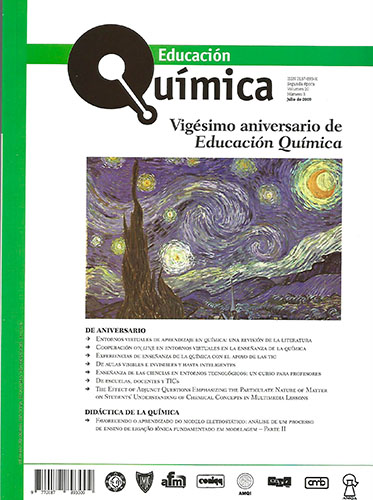The Effect of Adjunct Questions Emphasizing the Particulate Nature of Matter on Students’ Understanding of Chemical Concepts in Multimedia Lessons
Main Article Content
Abstract
This study investigated the use of three types of adjunct questions to enhance and assess student learning of molecular-level chemistry concepts. Subjects were 98 volunteers in a college–level general chemistry course. The subjects were divided into three groups, each of which completed the same multimedia computer lessons, but different types of adjunct questions: (a) text-based macroscopic/symbolic questions, (b) text-based questions emphasizing the particulate nature of matter, and (c) pictorial questions emphasizing the particulate nature of matter. A conceptual test was administered, consisting of three parts: (1) macroscopic/symbolic text-based items, (2) molecular-level text-based items, and (3) molecular-level pictorial items. No significant differences were found among the three groups on any part of the test using scores on the TOLT (an assessment of formal reasoning ability), FIT (an assessment of mental capacity), and a pre-test as covariates. There was a significant positive relationship between TOLT scores and each of the three parts of the test. There was also a significant positive relationship between FIT scores and scores on the macroscopic and pictorial parts of the test. Formal reasoning ability accounted for more variance among test scores for all three parts of the test than did mental capacity
Article Details
Citas en Dimensions Service

Educación Química por Universidad Nacional Autónoma de México se distribuye bajo una Licencia Creative Commons Atribución-NoComercial-SinDerivar 4.0 Internacional.
Basada en una obra en http://www.revistas.unam.mx/index.php/req.




